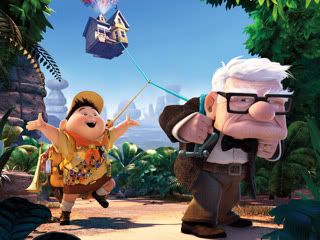 Up
Up Directed by: Pete Docter
Year: 2009
Starring: Ed Asner, Christopher Plummer,
and Additional Voices
Let's face it: 2009(and the Aughts itself for that matter) was a dark year in movies. Men were sent to the epicenter of a chaotic war to dismantle bombs and fight for their country. A young, obese, and fragile young woman breaks free from her abusive past, all the while struggling with what life has given her. A tiny German village is shaken by a series of violent episodes, and only the children seem to know what's really going on. Yes, it was a bleak year to end a bleak decade marked by violence, war, prejudice, and a host of other tragedies to strike the world we live in. Yet, amidst sadness and fear, horror and dismay, moments of significant beauty still do exist. Pixar knows this, this is made more clear with every movie they produce. Up is no exception, and in truth, it is a prime example of Pixar's magic.
Up begins with a simple love story, Carl, a timid boy enamored by adventure, one day meets Ellie, a brash, free spirited and feisty girl. Their plan: to fly to South America and live on Paradise Falls, the site where their hero, Charles, Muntz, is searching for a rare species. Together, they form a bond that is more believable and tender than the brunt of love stories to come out in the past decade(I'm looking at you, The Notebook). Magically, their friendship is told through a silent five minute vignette that encompasses every aspect of their long lives together, good and bad, from marriage to Ellie's death. The end result is absolutely touching and quite heartbreaking, it sets up the rest of the film, holding up a giant flag that tells the audience "Yes, this is what we are capable of conveying in five minutes, but you haven't seen anything yet!"
Carl, now an elderly man, still lives in the house he and Ellie built together, though age has made him a curmudgeon. As he's aged, so has the world around him, and his little house is now at risk of being torn down. After an altercation, Carl is told he must be shipped off and sent to a nursing home. Though simple Pixar brain power, and a hint of magic, Carl concocts a plan to fly to his dream spot, Paradise Falls. His means of transportation? His house, which he lifts by using a large supply of balloons to carry him away. However, he has an unexpected passenger aboard his 'aircraft', a young boy, Russell, who is an Eagle Scout one badge short of becoming a wilderness explorer.
The story behind Up focuses on the journey these two characters go through and what they come across along the way. Add in a rare bird, a pack of talking dogs, and Charles Muntz himself, who is now hellbent on capturing the bird who befrends Carl and Russell. Pixar is no stranger to diverse plots that are fully fleshed out, after having made toys come to life, monsters turn into caring creatures, and rats into culinary chefs, they prove once again that they can do anything.
In the end, Up's overall message is simple, yet endearing. The adventures we cherish are the ones that are the most unexpected. Carl is searching for a way to nurse his broken heart, and to lay the love of his life to rest. Russell wants to prove to his father that he is good enough, and that he is adventurous enough. Overall, it's simply magical, it's ripe with emotion, humor, and life, something that many films, kids or adult, seem to miss. It'll carry you away on a balloon to the clouds, where we all know troubles melt like lemon drops.





